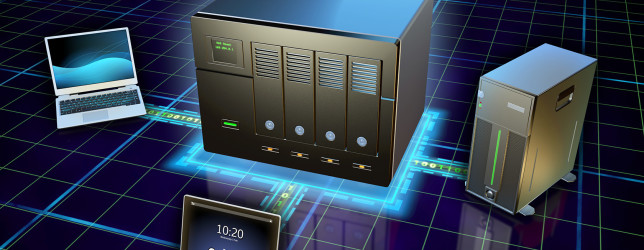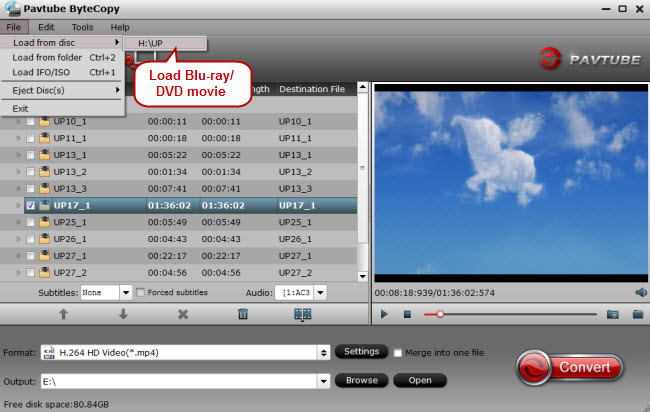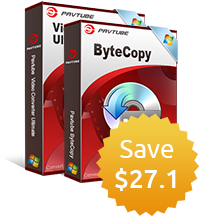Editor's note: People store their data on Network Attached Storage or Cloud Storage to get the way of being able to access all their files on any of their computing devices. But NAS versus Cloud, which one to choose?
It is likely that your movies are the ones responsible for making this question acute. It's the most space-consuming files you have. At one time, we prefer to store them somewhere safely (like on a bunch of DVDs). But nowadays, we want to store them keeping connected so we can get access to them on our various kinds of multimedia players, such as iPhone Air 3, iPad Pro 9.7. That's basically the reason our new heroes today are Cloud and NAS. Facing with these two excellent choices, which one you should choose today?
Similar Search: PC vs Cloud: What's the Difference?

Part One: NAS vs Cloud: Which Remote Storage Is Right for You?
What Is Network Attached Storage?
Network Attached Storage system includes a processor, memory and space for hard drive storage, that is connected to a local network so that it can be accessed remotely either through connected computers, wireless devices, or even on the go with a Dynamic DNS, say from No-IP.
A NAS gives you the security of physically owning the drive on which your photo, music, documents, media and other data is stored, while also having the convenience of being able to access that data from anywhere. It can also be shared with multiple users, in lieu of a more powerful server.
If you own a desktop PC, laptop and tablet and want to access all your movie files for streaming — on each device, then you may be an ideal candidate for a NAS.
What Is The Cloud?
Cloud storage is becoming the new standard for file sharing and storing among companies and corporations. A cloud is a vast array of computers that are hooked together and meant to operate as a single ecosystem. Clouds are configured to offer one or more services (e.g. data storage, content delivery, or applications) and users, like you and me, can access these services remotely.
Let's make things clear. Cloud storage is renting up a space from a provider. You can imagine it as renting a space in several NAS devices standing somewhere in the world. On the other hand, NAS provides a space for the whole local network and usually finds its place in your dorm room. With the ability to store and share data most NAS devices can also run as servers (for your website, FTP or else). And considering UPnP and DLNA support as multimedia servers, in particular.
Currently, there are many Cloud Storage providers for people to choose to store their media backup. Top Cloud Storage includes Dropbox, Amazon Cloud Drive, Google Drive, Box, Microsoft OneDrive, or something else.
Part Two. How to Backup DVD discs for storing in NAS or Cloud
You may have collected a bunch of DVDs no matter they are burned to from your HD recordings, or some commercial DVD movies. When you have a Cloud Storage or NAS, you must want to backup them to the storage. So how to backup your DVDs for storing in NAS or Cloud?
Backing up DVD to Cloud or NAS, you need a DVD Ripper. A plenty of searching on Google, you can find so many choices. Here, we strongly recommend you Pavtube ByteCopy (Get Mac version). It perfectly supports for both DVD and Blu-ray movies and can rip copy-protected Blu-ray and DVD for backing up to various cloud storage services including Google Drive, Dropbox, Microsoft OneDrive and popular NAS such Synology NAS, WD My Cloud NAS, Seagate Wireless Plus, QNAP NAS, FreeNAS. Moreover, it also can output DVD/Blu-ray in small file size for uploading to Cloud and NAS. The program enables you to select only your favorite chapters to backup. The built-in trim function also helps you to convert only your wanted parts of DVD/Blu-ray movies.
Free Download or Purchase
Snapshot:

Simple Steps to backup DVD to Cloud and NAS
Step 1: Click "File"; "Load from disc" to import DVD movies to the program. This program will automatically select the main title by taking the tick in front of it. This app also support batch conversion so add more than one DVD movies at a time if needed. You can choose forced subtitle below the chapter list.
Step 2: Open "Format" drop-down list. Here, you can see hundreds of video formats. Generally, Cloud and NAS support various video and audio format but your ultimate media player may have limited video format. So for the widest compatibility and high definition, HD MP4 is suggested in "HD Video" profile. In addition, if your multimedia players support MKV, lossless MKV is also recommended with all the info preserved.
Tip: If you want to preview the size of output DVD backups, you can click "Settings". Here, you not only can preview the output size but also adjust video and audio parameters. If you want to shrink DVD movies to a smaller size, you can decrease the bitrate.
Step 3: Go back to the main interface, press right-bottom "Convert" button to start to rip DVD to MP4 or other digital version so that you can store the DVD discs on Cloud and NAS.
Part Three. You Also can Backup DVD to External Hard Drive/Hard Disc
Apart from Cloud and NAS, you also can store your DVD movies on External Hard Drive or External HDD. This way not only can make you store your data safely but also can give you the convenience to carry your movies any where without DVD discs wasting the room of luggage.
The 10 Best External Hard Drives of 2016
Apricorn Aegis Padlock DT FIPS (4TB)
LaCie Fuel
Seagate Backup Plus Desktop Drive (5TB)
Seagate Backup Plus Portable Drive (4TB)
Buffalo MiniStation Extreme NFC (1TB)
CalDigit T4 RAID (8TB)
LaCie Rugged RAID (4TB)
Promise Pegasus2 R2+ (6TB)
SanDisk Connect Wireless Media Drive (32GB)
Western Digital My Passport Ultra (2TB)



